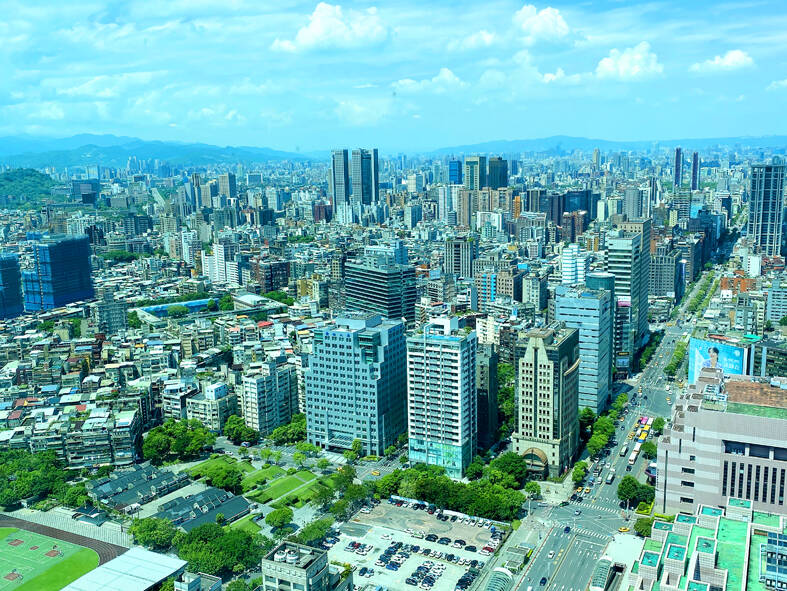The number of people holding non-owner-occupied or vacant homes this year increased by 19,661 to 545,586, as more people own one or two residential properties that are not in use, data compiled by the Ministry of Finance (MOF) showed yesterday.
The number of people owning vacant homes has continued to increase in the past few years, a development that has triggered public grievance about unaffordable housing and prompted the government to introduce a series of measures to curb property hoarding.
The latest data showed that there were 441,841 people with one home that was not in use this year, up from 422,697 last year and accounting for 80.98 percent of the total, while 67,783 people held two vacant homes, up slightly from the year before to account for 12.42 percent.

However, the number of people owning three ore more vacant homes has continued to decline in the past few years, the ministry said.
For instance, there were 36,707 people who held three or more vacant residential properties last year, but the number dropped to 35,962 this year, accounting for 6.59 percent of the total, it said.
Furthermore, 8,781 people held five or more vacant properties this year, down from 9,127 last year, and 1,659 owned 10 houses or more, down from 1,608, it said.
To rein in house hoarding and property price hikes, the Executive Yuan last month approved a proposal imposing different tax rates on residential property ownership, with holders of multiple vacant properties paying a higher tax.
The plan, which is subject to lawmakers’ approval, aims to raise the tax on three or more vacant residential properties to between 2 and 4.8 percent of their value, from the existing 1.5 to 3.6 percent.
If the Legislative Yuan passes the plan in the upcoming session, the government hopes to implement it in July next year.

Micron Memory Taiwan Co (台灣美光), a subsidiary of US memorychip maker Micron Technology Inc, has been granted a NT$4.7 billion (US$149.5 million) subsidy under the Ministry of Economic Affairs A+ Corporate Innovation and R&D Enhancement program, the ministry said yesterday. The US memorychip maker’s program aims to back the development of high-performance and high-bandwidth memory chips with a total budget of NT$11.75 billion, the ministry said. Aside from the government funding, Micron is to inject the remaining investment of NT$7.06 billion as the company applied to participate the government’s Global Innovation Partnership Program to deepen technology cooperation, a ministry official told the

Taiwan Semiconductor Manufacturing Co (TSMC, 台積電), the world’s leading advanced chipmaker, officially began volume production of its 2-nanometer chips in the fourth quarter of this year, according to a recent update on the company’s Web site. The low-key announcement confirms that TSMC, the go-to chipmaker for artificial intelligence (AI) hardware providers Nvidia Corp and iPhone maker Apple Inc, met its original roadmap for the next-generation technology. Production is currently centered at Fab 22 in Kaohsiung, utilizing the company’s first-generation nanosheet transistor technology. The new architecture achieves “full-node strides in performance and power consumption,” TSMC said. The company described the 2nm process as

Shares in Taiwan closed at a new high yesterday, the first trading day of the new year, as contract chipmaker Taiwan Semiconductor Manufacturing Co (TSMC, 台積電) continued to break records amid an artificial intelligence (AI) boom, dealers said. The TAIEX closed up 386.21 points, or 1.33 percent, at 29,349.81, with turnover totaling NT$648.844 billion (US$20.65 billion). “Judging from a stronger Taiwan dollar against the US dollar, I think foreign institutional investors returned from the holidays and brought funds into the local market,” Concord Securities Co (康和證券) analyst Kerry Huang (黃志祺) said. “Foreign investors just rebuilt their positions with TSMC as their top target,

POTENTIAL demand: Tesla’s chance of reclaiming its leadership in EVs seems uncertain, but breakthrough in full self-driving could help boost sales, an analyst said Chinese auto giant BYD Co (比亞迪) is poised to surpass Tesla Inc as the world’s biggest electric vehicle (EV) company in annual sales. The two groups are expected to soon publish their final figures for this year, and based on sales data so far this year, there is almost no chance the US company led by CEO Elon Musk would retain its leadership position. As of the end of last month, BYD, which also produces hybrid vehicles, had sold 2.07 million EVs. Tesla, for its part, had sold 1.22 million by the end of September. Tesla’s September figures included a one-time boost in